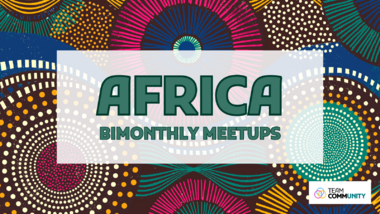March 21 2024, Africa Meetup
The Africa Regional Meetups are bimonthly video calling gatherings that bring together folks from the African region to share, connect, seek help, and release stress by celebrating each other. In addition, it is a time for us to find ways to support each other, and help us understand what is happening in our part of the world. If you cannot attend the monthly meetups, we are taking notes of each gathering and linking to them below.
The African community is connected during the week in different ways. Either through the African channel on the TCU Mattermost or via different events organized on various topics during the year.
Date: Thursday, March 21 2024
Time: 11am EDT / 3pm UTC (What time is it in my city?)
Who: Facilitated by Mardiya
Where: The link will be shared in the Regional Africa channel on the TCU Mattermost one or two hours before the start of the meeting.
- Don't have an account to the TCU Mattermost? you can request one following the directions here.
Notes: Please put notes here: https://pad.riseup.net/p/africa-meetup
Notes
| Africa Meetups |
Attendees: 13 - 12
This conversation was necessary because we have a country that has been considered a beacon of democracy, however there has been a lot of clamp down on the opposition since the recent president has stepped down. Since there has been a lof to blocking of apps like TikTok and shutting down of media houses. Additoinally, the elections in Senegal will be on the 24th of March, after already being postponed. There is an expectation that there will be more shutdowns and blocking.
What have been the political dynamics in Senegal that have led to the network manipulation?
- There has been a decline since 2010 in democratic practices.
- There has been a decline in the non-material needs of people (rights, etc.)
- Within the last 6 months there has been a steep decline with the current
- A political party has a list of candidates and then the candidates are delegated based on the percentage vote won by the political party - a parliamentary system.
- You have a system in place that allows the political party to consolidate power, and at the same time you have a younger generation that is pushing back against it along with the opposition narrative.
- There is high youth unemployement, the economy is controlled by the informal sector (with big companies still functioning in the informal sector).
- Lots of natural resources that Senegal, including fish.
- The current president is pushing back harshly agaisnt the opposition.
- All of the limitations on rights in the physical world, have moved online, also in the format of internet shutdowns.
- There is an attempt to bring to court the internet shutdowns as a violation of human rights.
- TikTok is being blocked as well as targeted websites being blocked.
What has been the nature of the shutdowns over the past year and in the recent couple of months?
- By "internet shutdown" we are actually talking about shutting down mobile data.
- Because most people only have access to mobile data, inhibiting mobile data is essentially cutting off the majority of the population.
- The law prohibits the use of a VPN in Senegal.
- However, they have not actually prosecuted anyone using this law. Last year when all social media platforms where blocked, many people used VPNs, but were not prosecuted for it.
- Blocking of TikTok since August.
- Speaker stopped using TikTok because it requires using a VPN.
- "Blocking" it originates or is concentrated in Dakar and then expands into other regions. Often different regions gain back access or lose access at different times.
- People use TikTok to report on and document protests.
- The documentation on TikTok, SnapChat, Twitter and Facebook have helped to document abuses that the police then try to cover up.
- People also use social media platorms for small businesses and the blocking has been financially / economically detrimental.
- The blocking has been regiional. Some areas suffer from worse blocking than others.
- Tor Project and Psiphon are both VPNs that have been recommended for individuals to use.
Outline (https://getoutline.org/):
- Organizations or individuals can create and run their own VPN on the cloud, and share access with their communities.
- The Outline community has a channel on the TCU Mattermost: https://community.internetfreedomfestival.org/community/channels/outline-community
- VPNs don't actually support when there is a mobile shutdown.
Intra (https://getintra.org/):
- Protects against DNS and SNI-based censorship
- It is completely free and faster than a VPN, and could potentially bypass VPN criminalization (depends on the specifics of the law).
- Uses encrypted DNS, making it more private. However, it does not tunnel the rest of your traffic. Doesn't add extra encryption.
- Because it connects to the destination directly, you get full performance. There's no added latency and slowdown that you get from tunneling. This is especially helpful for video. And because there's no server or extra traffic, there's nothing to pay for.
- There's a new version in Beta that is more powerful against SNI-based blocking: https://play.google.com/apps/testing/app.intra
In the case of mobile data outages, people resort to using direct calls and using SMS if they ahve access. Calls are expensive and SMS are expensive. It would be helpful to have network measurement in Senegal to track the shutdowns across the coutnry.
Recommendation & Reflection Questions:
- CeNo browser for example: https://censorship.no/en/index.html
- IODA can show regional shutdowns: https://ioda.inetintel.cc.gatech.edu/
Are there tools robust enough to indicate specific regions of disruption such as what happened during a rally in a Harare suburb in 2021/2022.
- You can use MeasurementLab to measure the network activity: https://speed.measurementlab.net/#/
